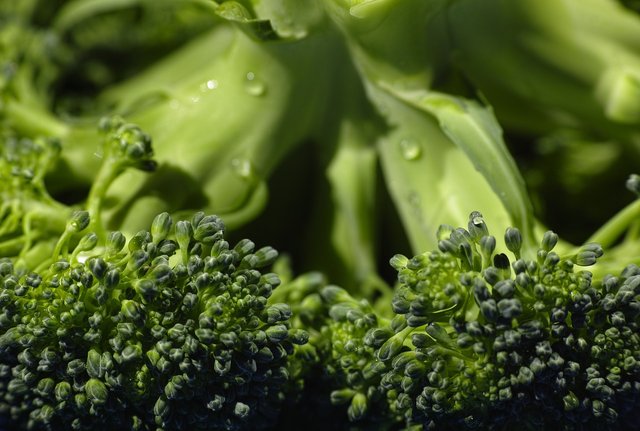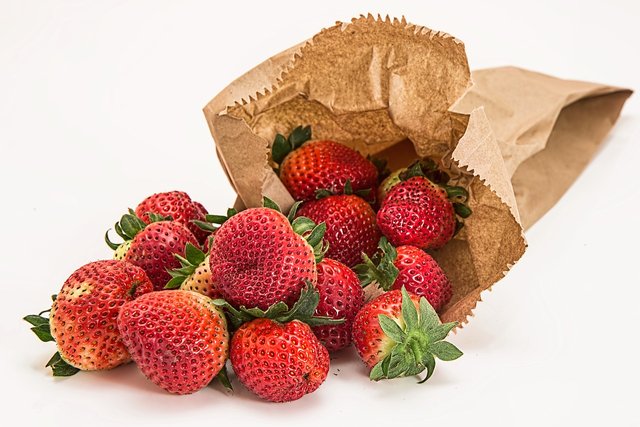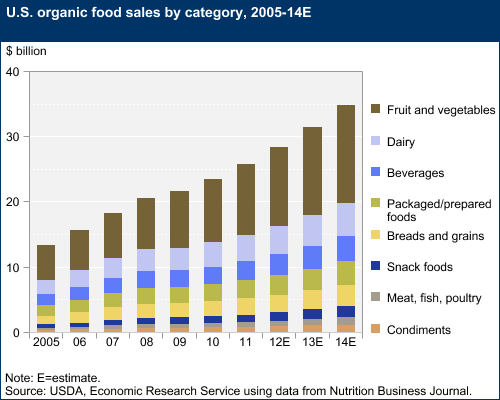
For 2016, it was estimated that the US had something around 4.1 million acres that were dedicated to organic farming.
This was said to be roughly an 11 percent increase from 2014. Organic acres are on the rise, but production has allegedly been slow and suppliers are struggling to keep up with demand.
In the past several years, domestic demand for organic products has continued to increase, according to a recent report from CoBank. Since 2011, organic sales have doubled and it's a market that pulls in billions of dollars every year. Sales for organic food in 2015 were estimated to be around $43 billion.
At the moment, 15 percent of all fruits and veggies eaten in the USA are organic.

The sale of organic vegetables, nuts, and fruits, has seen a dramatic increase in the past several years. Despite a number of news stories suggesting that there is no difference (in the way of nutritional benefit) between organic and non, and that some businesses are using the organic label in a fraudulent manner.
According to the recent report from CoBank, it's suggested that more domestic farmers need to transition to growing organic in order to keep up with the growing demand.
When it comes to the amount of organic food the US has imported, that market has seen a growth of around 800 percent between 2011 and 2013; it's since leveled off.
It's believed that over the next 3-5 years, the organic US market will be placed under constant pressure. And when it comes to what sells the most within the organic market, produce is said to make up roughly 40 percent of all organic food sales. There's also organic cheese, organic milk, organic chips, organic chocolate, and a variety of other food items aside from produce.

Right now, the biggest seller in the US of organic food is said to be Costco, and experts in this area say that the organic section has morphed now and grown; it isn't just a niche market any longer. It used to be just a handful of stores that specialized in selling organic but now you can find organic items increasingly available at bigger chains, like Walmart, Costco, Target, and others.
And these bigger chains are trying to offer the organic items at a competitive and lower price point, which helps to introduce even more people into the organic market. It makes it affordable for them to be able to purchase these products when they are priced in a way that they can afford.
However, the downside is that it's increasing the pressure on organic suppliers. There is a fear that they won't be able to keep up with that demand. Because of this issue, we might see supply issues arise or an increase in price come about on certain products that become difficult to obtain in a timely manner.
Interest and demand for organic products isn't only growing in the US, it's expanding around the world. The global organic food market for 2014 was estimated to be around $80 billion.

Pics:
Pixabay
USDA - *Economic Research Service using data from NBJ via www.ers.usda.gov/topics/natural-resources-environment/organic-agriculture/organic-market-overview/
Sources:
http://civileats.com/2016/11/09/u-s-organic-farmland-hits-record-4-1-million-acres-in-2016/
http://www.fooddive.com/news/grocery--increasing-demand-for-organic-produce-could-pressure-grocers/444641/
http://www.feedstuffs.com/news/surging-demand-organic-produce-widens-us-supply-gap
https://www.ota.com/news/press-releases/19031
http://theorganicreport.com/global-organic-food-market-reaches-80-billion
Related Posts:
Organic Doesn't Always Mean Pesticide-Free
https://steemit.com/health/@doitvoluntarily/organic-doesn-t-always-mean-pesticide-free
Here in Bulgaria where I live, almost everything is homegrown and organic, you can see old people selling vegies in small shops on the streets, making a small profit to go by with.
Downvoting a post can decrease pending rewards and make it less visible. Common reasons:
Submit
gotta eat organic!
Downvoting a post can decrease pending rewards and make it less visible. Common reasons:
Submit
The demand for organic food has risen here as well in a very large way. But I know for a fact that many of the products that are so advertised are not truly organic. Basically just 40% more expensive but same stuff if you ask me.
Downvoting a post can decrease pending rewards and make it less visible. Common reasons:
Submit
yes this has been the case many times and even fish has been mislabeled that is farmed but marketed as wild :/
Downvoting a post can decrease pending rewards and make it less visible. Common reasons:
Submit
That's indeed a serious problem. And my guess is that it has a lot to with why there is so much money to be made within the organic market. Your paying to ease your conscious.
Downvoting a post can decrease pending rewards and make it less visible. Common reasons:
Submit
That's great news!! We are very lucky in Cambodia to have so many organic, local farmers.
Downvoting a post can decrease pending rewards and make it less visible. Common reasons:
Submit
I went to the grocery store yesterday and the organic produce wasn't too fresh and it's always overpriced. I think the concept of growing your own organic food is an excellent idea! I want to learn more about how to do it!
I think the population is staring to realize the importance of organics which is increasing the demand dramatically! Thanks for sharing and bringing us top notch content!
Downvoting a post can decrease pending rewards and make it less visible. Common reasons:
Submit
Check out the gardening category here. A lot of good posts on organic gardening. I try to put a few out every week.
Downvoting a post can decrease pending rewards and make it less visible. Common reasons:
Submit
Thanks for letting me know! Just followed you.
Downvoting a post can decrease pending rewards and make it less visible. Common reasons:
Submit
That's great. I've only been here about a month but if you go back to my earlier posts I discuss the pros and cons of raised beds and conventional beds which may be a good place to start if you don't already have a garden.
Downvoting a post can decrease pending rewards and make it less visible. Common reasons:
Submit
I will definitely check out some of your previous posts in hopes of educating myself further on this topic! Thanks again!
Downvoting a post can decrease pending rewards and make it less visible. Common reasons:
Submit
Good deal. Let me know if you have any questions and I'll try to answer. Good luck.
Downvoting a post can decrease pending rewards and make it less visible. Common reasons:
Submit
Much appreciated!
Downvoting a post can decrease pending rewards and make it less visible. Common reasons:
Submit
So true...it s actually happening in all over the world...organic food actually taste different ...and double the cost...
Downvoting a post can decrease pending rewards and make it less visible. Common reasons:
Submit
i sure see a difference with the eggs.. I try to go for pasture raised /organic and you can tell just the color of the yolk is much different than a cheap factory farm egg
Downvoting a post can decrease pending rewards and make it less visible. Common reasons:
Submit
Yes,the organic egg yolk is darker(orange kind) colour..and chicken soup can see the different..the soup from organic chicken turns to pudding in fridge in 3 hours time..the other one is just water feeling
Downvoting a post can decrease pending rewards and make it less visible. Common reasons:
Submit
great post organic for me all the way!
Downvoting a post can decrease pending rewards and make it less visible. Common reasons:
Submit
Growing organic food is harder than i thought.
Downvoting a post can decrease pending rewards and make it less visible. Common reasons:
Submit
takes time and patience :)
Downvoting a post can decrease pending rewards and make it less visible. Common reasons:
Submit
True, but it gets worth it and the feeling seeing it grow is just ... joy
Downvoting a post can decrease pending rewards and make it less visible. Common reasons:
Submit
When you grow organic, you need twice the amount of space as a "chemical pesticide" farm to grow the same amount of food. Also, many people think that growing organically means NO pesticides, which isn't true. It's just DIFFERENT pesticides, which is a very misleading concept. Plus people are willing to pay up to 23% more for the organic label.... sadly organic tends to be more of a marketing scheme than actually beneficial (at least here in the US).
Downvoting a post can decrease pending rewards and make it less visible. Common reasons:
Submit
I guess everyone cares about their health, thats why theres a huge demand on organic foods, food is so important and maybe this could encourage more people to start their own farm.
Downvoting a post can decrease pending rewards and make it less visible. Common reasons:
Submit
even if it's just a small hydroponics one lol :)
Downvoting a post can decrease pending rewards and make it less visible. Common reasons:
Submit
@doitvoluntarily, cool update. In Nigeria, it is becoming more difficult to find organic fruits and veggies. The US are doing great on this.
Downvoting a post can decrease pending rewards and make it less visible. Common reasons:
Submit
Times are changing faster than ever.... more and more people are getting more information about all the bullshit these corporations like Monsanto been doing to our food. ORGANIC FOREVER!
Downvoting a post can decrease pending rewards and make it less visible. Common reasons:
Submit
Very informative post :)
Downvoting a post can decrease pending rewards and make it less visible. Common reasons:
Submit
I buy organic as much as possible. It is becoming easier and the organic grass fed meats are the things that I think have increased the most recently. I always check out the dirty dozen/clean fifteen from EWG each year. It varies from year to year but some items always make the 12 like apples, strawberries and celery.
Downvoting a post can decrease pending rewards and make it less visible. Common reasons:
Submit
I have a friend who has a blueberry farm and for years he was certified organic. He now has dropped the certification because of the regulations and cost associated with that designation. But has not changed his growing practices.
And another story that also goes along with that. The farm where we were getting our raw milk is now out of business because of regulations and cost.
Our healthy food providers are being forced out of business to pave the way for the altered garbage that is marketed as food. Great post, thanks for taking the time to write and share.
Downvoting a post can decrease pending rewards and make it less visible. Common reasons:
Submit
yes i have heard about farms not being able to afford the certification, some go through third-party organic verification as a result, thanks for your feedback @marymg2014 :) always happy to see you comment
Downvoting a post can decrease pending rewards and make it less visible. Common reasons:
Submit
At times, organic isn't "organic" - the only thing organic about it is the label.
possible reasons though as to why individuals do opt for organic foods, is simply because (from my perspective), the modified stuff has always been linked to illnesses/diseases ...
Downvoting a post can decrease pending rewards and make it less visible. Common reasons:
Submit
Hi what does organic farming mean? I thought it was pesticide free
Downvoting a post can decrease pending rewards and make it less visible. Common reasons:
Submit
You have many interesting articles! Thank you! I follow you!
Downvoting a post can decrease pending rewards and make it less visible. Common reasons:
Submit
I remember USDA Certified Organic will allow you to say "made with" organic ingredients if at least 70% of your raw ingredients are organic.
https://www.ams.usda.gov/sites/default/files/media/Labeling%20Organic%20Products.pdf
https://www.ams.usda.gov/publications/content/allowed-prohibited-substances
I will say there is a flavor and freshness in organic items that makes those items stamd out. In particular, organic beers and wines have that extra flavor that makes them stand out.
Downvoting a post can decrease pending rewards and make it less visible. Common reasons:
Submit
That is good news that people are waking up to good nutrition and learning about the hard crappy food is going to us humans.
Downvoting a post can decrease pending rewards and make it less visible. Common reasons:
Submit
good post.
Downvoting a post can decrease pending rewards and make it less visible. Common reasons:
Submit
I am very happy if you want to see and give feedback about my post ... thank you
Downvoting a post can decrease pending rewards and make it less visible. Common reasons:
Submit
Real deal articel. P.s how did you get 50 upvotes I first6 minutes?
Downvoting a post can decrease pending rewards and make it less visible. Common reasons:
Submit
the majority of the upvotes usually come within the first 2 hours
Downvoting a post can decrease pending rewards and make it less visible. Common reasons:
Submit
I see now ,also you have 2k+ followers.
Downvoting a post can decrease pending rewards and make it less visible. Common reasons:
Submit
Even farmers face a dilemma to go for organic or conventional farming. There have been reports that stated organic farming productivity is less compared to conventional farming.
Downvoting a post can decrease pending rewards and make it less visible. Common reasons:
Submit
not when it comes to hydroponic farming and vertical farming, it's much faster and more efficient than growing organic crops in a traditional way :)
Downvoting a post can decrease pending rewards and make it less visible. Common reasons:
Submit
Never heard about hydroponic farming..thanks for sharing...will google more about it...that's why I like commenting on interesting topics...I get to learn about new things every time :)
Downvoting a post can decrease pending rewards and make it less visible. Common reasons:
Submit
:) aquaponics is promising too :) and underground greenhouses lol
Downvoting a post can decrease pending rewards and make it less visible. Common reasons:
Submit
haha..
Downvoting a post can decrease pending rewards and make it less visible. Common reasons:
Submit
As much as I like that people are aware of what types of food they eat I also feel a bitter aftertaste in regards to the whole organic market. During my last visit in California about a month ago I was seriously shocked by the prices at wholefood. Straight madness compared to organic shops in the Netherlands. It was fine for though, I was sipping on Soylent :)
Nice post! Would love to see more food related posts! upvoted and resteemed.
Downvoting a post can decrease pending rewards and make it less visible. Common reasons:
Submit
I am a very big fan of organic farming but the place where I live doesn't have much support. But if there's a rising demand then the people will be bound to switch to organic farming I guess. Good post. Cheers!!!!!!
Downvoting a post can decrease pending rewards and make it less visible. Common reasons:
Submit
Americans had forgotten their roots for decades. We are slowly getting back to appreciating real, local foods. Farmers play a large role in this transition, but we should also get back to growing our own produce.
Chemical-laced green lawns are the anomaly - productive gardens are the historical norm. Wild foraging is great too, but less accessible. As in the past, this is not a luxury, but a survival tool. Take your nutrition and wellness into your own hands.
Downvoting a post can decrease pending rewards and make it less visible. Common reasons:
Submit
In Romania the organic food is like 4-5 times higher than the normal prices. And the ironic part here is that you actually pay more if you farm the land with insecticides, pesticides, azot and other chemicals.
Downvoting a post can decrease pending rewards and make it less visible. Common reasons:
Submit
Conventional farming requires many additives, but the produce is more stable for longer periods. This is not highly nutritious, but more profitable. Natural foods waste more quickly (this is good), so they are more expensive to ship and stock, especially over long distances. The solution is a more local supply chain - and seasonal eating. Just like the old days. Ironically, technology (internet, blockchain) can be a major enabler in this process.
Downvoting a post can decrease pending rewards and make it less visible. Common reasons:
Submit
Organic food is the way to go.
Downvoting a post can decrease pending rewards and make it less visible. Common reasons:
Submit
I think to make small gardern on my top house
Downvoting a post can decrease pending rewards and make it less visible. Common reasons:
Submit
I find myself buying usda organic stuff sometime more than before.
Downvoting a post can decrease pending rewards and make it less visible. Common reasons:
Submit
Interesting and cool post)
Thank you for sharing)
Downvoting a post can decrease pending rewards and make it less visible. Common reasons:
Submit
I have upvote and follow you please visit my have and upvote
Downvoting a post can decrease pending rewards and make it less visible. Common reasons:
Submit